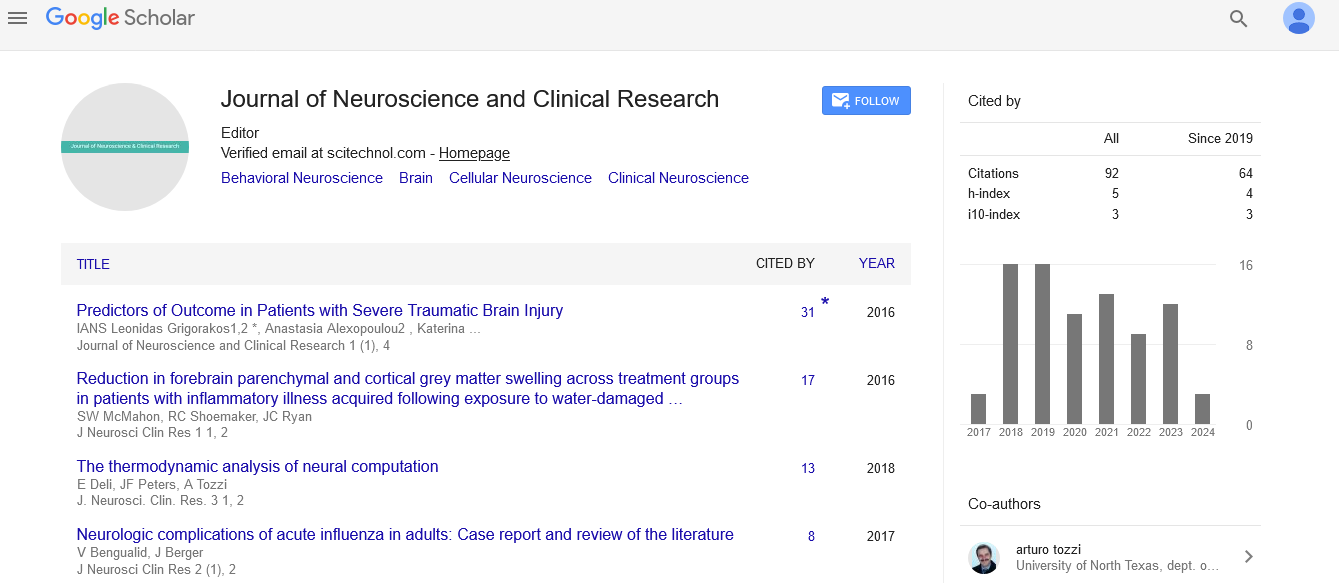Commentary, J Neurosci Clin Res Vol: 8 Issue: 2
Neurological Problems in Children: Early Identification and Intervention
Andrew Polyak*
Department of Biochemistry and Molecular Biology, Pennsylvania State University, University Park, United States of America
*Corresponding Author: Andrew Polyak
Department of Biochemistry and Molecular Biology, Pennsylvania State University,
University Park, United States of America
E-mail: andrewp@gmail.com
Received date: 29 May, 2023, Manuscript No. JNSCR-23-106764;
Editor assigned date: 31 May, 2023, PreQC No. JNSCR-23-106764 (PQ);
Reviewed date: 14 June, 2023, QC No. JNSCR-23-106764;
Revised date: 21 June, 2023, Manuscript No. JNSCR-23-106764 (R);
Published date: 28 June, 2023, DOI: 10.4172/Jnscr.1000158
Citation: Polyak A (2023) Neurological problems in children: Early Identification and Intervention. J Neurosci Clin Res 8:2.
Description
Neurological disorders in children can have a profound impact on their overall development and quality of life. These disorders encompass a wide range of conditions that affect the nervous system, including the brain, spinal cord, and peripheral nerves. Early identification and intervention play a vital role in managing these disorders effectively and minimising their long-term effects. By recognising the signs and symptoms early on, healthcare professionals, parents, and educators can provide appropriate support and interventions tailored to the specific needs of each child.
One of the key challenges in identifying neurological disorders in children is the variability of symptoms and the overlapping nature of these conditions. Neurodevelopmental disorders, such as Autism Spectrum Disorder (ASD) and Attention-Deficit/Hyperactivity Disorder (AD/HD), are characterised by a diverse range of symptoms that can manifest differently in each child. Other conditions, such as cerebral palsy, epilepsy, and genetic disorders, also present with unique clinical features. Therefore, it is essential to be vigilant and observant when monitoring a child's developmental milestones.
Early red flags for neurological disorders can include delays in reaching developmental milestones, abnormal muscle tone, seizures, language and communication difficulties, social interaction challenges, and sensory processing issues. It is essential for parents and carers to engage in regular developmental screenings and maintain open lines of communication with healthcare professionals. Paediatricians, neurologists, and child psychologists are well-equipped to conduct comprehensive assessments and screenings to identify potential neurological disorders.
Once a child has been identified as at-risk or showing signs of a neurological disorder, early intervention becomes paramount. Early intervention programmes are designed to provide specialised therapies, support, and educational interventions tailored to the unique needs of each child. These interventions can include speech and language therapy, occupational therapy, physical therapy, behaviour therapy, and educational interventions. The goal is to promote optimal development, enhance functional abilities, and improve the child's overall quality of life.
Investigation has consistently shown that early intervention leads to better outcomes for children with neurological disorders. By addressing the specific needs of the child during their important developmental period, it is possible to optimise their potential for growth and minimise the impact of the disorder. Early intervention also provides an opportunity for parents and carers to receive guidance, support, and resources to navigate the challenges associated with raising a child with a neurological disorder.
In addition to early intervention programmes, a multidisciplinary approach involving various healthcare professionals is essential for comprehensive care. Collaboration between paediatricians, neurologists, therapists, psychologists, and educators allows for a holistic assessment and the development of an individualised treatment plan. This team-based approach ensures that all aspects of the child's well-being are considered, from medical management to educational support.
Furthermore, raising awareness about neurological disorders in children is essential for early identification and intervention. Parent education programmes, community workshops, and public campaigns can help disseminate information about the signs and symptoms of these disorders, promote early screening, and emphasise the importance of seeking timely professional help. It is essential to foster a supportive and inclusive environment that acknowledges the unique challenges faced by children with neurological disorders and their families.
Conclusion
Early identification and intervention are vital for children with neurological disorders. By recognising the signs and symptoms early on, appropriate support and interventions can be provided to maximise the child's potential for development and improve their quality of life. Through collaborative efforts between healthcare professionals, parents, and educators, one can develop a nurturing environment that empowers children with neurological disorders to thrive and reach their full potential.
 Spanish
Spanish  Chinese
Chinese  Russian
Russian  German
German  French
French  Japanese
Japanese  Portuguese
Portuguese  Hindi
Hindi 